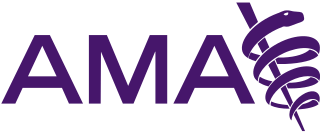Related Research Articles

A physician, medical practitioner, medical doctor, or simply doctor, is a health professional who practices medicine, which is concerned with promoting, maintaining or restoring health through the study, diagnosis, prognosis and treatment of disease, injury, and other physical and mental impairments. Physicians may focus their practice on certain disease categories, types of patients, and methods of treatment—known as specialities—or they may assume responsibility for the provision of continuing and comprehensive medical care to individuals, families, and communities—known as general practice. Medical practice properly requires both a detailed knowledge of the academic disciplines, such as anatomy and physiology, underlying diseases and their treatment—the science of medicine—and also a decent competence in its applied practice—the art or craft of medicine.
Osteopathic medicine is a branch of the medical profession in the United States that promotes the practice of science-based medicine, often referred to in this context as allopathic medicine, with a set of philosophy and principles set by its earlier form, osteopathy. Osteopathic physicians (DOs) are graduates of American osteopathic medical colleges and are licensed to practice the full scope of medicine and surgery in all 50 US states. The field is distinct from osteopathic practices offered in nations outside of the U.S., whose practitioners are generally not considered part of core medical staff nor of medicine itself, but rather are alternative medicine practitioners. The other major branch of medicine in the United States is referred to by practitioners of osteopathic medicine as allopathic medicine.

The American Medical Association (AMA) is a professional association and lobbying group of physicians and medical students. Founded in 1847, it is headquartered in Chicago, Illinois. Membership was 271,660 in 2022.

The National Medical Association (NMA) is the largest and oldest organization representing African American physicians and their patients in the United States. As a 501(c)(3) national professional and scientific organization, the NMA represents the interests of over 30,000 African American physicians and their patients, with nearly 112 affiliated societies throughout the nation and U.S. territories. Through its membership, professional growth, community health education, advocacy, research, and collaborations with public and private organizations, the organization is dedicated to enhancing the quality of health among minorities and underprivileged people. Throughout its history, the NMA has primarily focused on health issues related to African Americans and medically underserved populations. However, its principles, goals, initiatives, and philosophy encompass all ethnic groups
Conceived in no spirit of racial exclusiveness, fostering no ethnic antagonism, but born of the exigencies of the American environment, the National Medical Association has for its object the banding together for mutual cooperation and helpfulness, the men and women of African descent who are legally and honorably engaged in the practice of the cognate professions of medicine, surgery, pharmacy and dentistry.
— C.V. Roman, M.D. NMA Founding Member and First Editor of the Journal of the National Medical Association (NMA) 1908
John C. Nelson is a physician who served as president of the American Medical Association.

Morris Fishbein was an American physician and editor of the Journal of the American Medical Association (JAMA) from 1924 to 1950.

A primary care physician (PCP) is a physician who provides both the first contact for a person with an undiagnosed health concern as well as continuing care of varied medical conditions, not limited by cause, organ system, or diagnosis. The term is primarily used in the United States. In the past, the equivalent term was 'general practitioner' in the US; however in the United Kingdom and other countries the term general practitioner is still used. With the advent of nurses as PCPs, the term PCP has also been expanded to denote primary care providers.
The American Medical Student Association (AMSA), founded in 1950 and based in Washington, D.C., is an independent association of physicians-in-training in the United States. AMSA is a student-governed national organization. They have a membership of 68,000 medical students, premedical students, interns, medical residents and practicing physicians across the country.

The American Osteopathic Association (AOA) is the representative member organization for the more than 176,000 osteopathic medical doctors (D.O.s) and osteopathic medical students in the United States. The AOA is headquartered in Chicago, Illinois, and is involved in post-graduate training for osteopathic physicians. Beginning in 2015, it began accrediting post-graduate education as a committee within the Accreditation Council for Graduate Medical Education, creating a unified accreditation system for all DOs and MDs in the United States. The organization promotes public health, encourages academic scientific research, serves as the primary certifying body for D.O.s overseeing 18 certifying boards, and is the accrediting agency for osteopathic medical schools through its Commission on Osteopathic College Accreditation. As of October 2015, the AOA no longer owns the Healthcare Facilities Accreditation Program (HFAP), which accredited hospitals and other health care facilities.
GLMA: Health Professionals Advancing LGBTQ Equality (GLMA) is an international organization of approximately 1,000 LGBT healthcare professionals and students of all disciplines. Its members include physicians, advanced practice nurses, physician assistants, nurses, behavioral health specialists, researchers and academician, and their supporters in the United States.

The Association of American Physicians and Surgeons (AAPS) is a politically conservative non-profit association that promotes conspiracy theories and medical misinformation, such as HIV/AIDS denialism, the abortion-breast cancer hypothesis, and vaccine and autism connections. The association was founded in 1943 to oppose a government attempt to nationalize health care. The group has included notable members, including American Republican politicians Ron Paul, Rand Paul and Tom Price.

Erica Frank is a U.S.-born educational inventor, physician, medical and educational researcher, politician, and public health advocate. Since 2006, she has been a professor in the Faculty of Medicine at the University of British Columbia (UBC); she is the Inventor/Founder of NextGenU.org, and the steward of the 1985 Nobel Peace Prize commemorative medal awarded to the International Physicians for the Prevention of Nuclear War - Canada.

Timeline of events related to sexual orientation and medicine
Doctors for America is a 501(c)(3) national, multi-specialty organization of physicians and medical students in the United States with a stated goal of improving affordable health care access. The movement, which was created by the Obama campaign, was started in 2008 as "Doctors for Obama" and rapidly grew to 10,000 members within a few months. It was founded by Alice Chen, Vivek Murthy, and Mandy Cohen.
Harvey John Tompkins, M.D. (1906–1983) was an American physician, a psychiatrist, whose professional life was in public service.

Edward K. "Eddie" Barsky was an American surgeon and political activist. Barsky is best remembered as the head of the Joint Anti-Fascist Refugee Committee, a Communist Party-sponsored organization which raised funds to aid refugees from the regime of Spanish strongman Francisco Franco in the late 1930s during the Spanish Civil War. In the 1950s Barsky became a cause célèbre as a victim of McCarthyism when he was imprisoned for refusing to provide information to the House Un-American Activities Committee.
The Good Doctors: The Medical Committee for Human Rights and the Struggle for Social Justice in Health Care is a 2009 non-fiction book by historian John Dittmer. The book documents the history of the Medical Committee for Human Rights (MCHR), a group of health professionals who delivered health care to wounded protesters and victims of police violence during the Civil Rights Movement and the anti-war movement in the United States in the 1960s, at a time when the health care system in the South was still segregated.

Concerns of both a current and future shortage of medical doctors due to the supply and demand for physicians in the United States have come from multiple entities including professional bodies such as the American Medical Association (AMA). The subject has been analyzed as well by the American news media in publications such as Forbes, The Nation, and Newsweek. In the 2010s, a study released by the Association of American Medical Colleges (AAMC) titled The Complexities of Physician Supply and Demand: Projections From 2019 to 2034 specifically projected a shortage of between 37,800 and 124,000 individuals within the following two decades, approximately.

Doris Howell was an American physician who specialized in pediatric oncology. She became known as the "mother of hospice," for her pioneering work in palliative care.

William Bronston is an American psychiatrist and activist. Bronston is known for his involvement in the deinstitutionalization of Willowbrook State School in the early 1970s. After returning to California in 1975, Bronston became the medical director of the Department of Developmental Disabilities at the California Department of Health.
References
- 1 2 3 4 Harmon, Robert G. (1978). "Intern and Resident Organizations in the United States: 1934-1977". The Milbank Memorial Fund Quarterly. Health and Society. 56 (4): 500–530. doi:10.2307/3349574. JSTOR 3349574.
- ↑ Mullan, Fitzhugh (2006). White Coat, Clenched Fist: The Political Education of an American Physician. University of Michigan Press. pp. 51–. ISBN 0-472-03197-X.
- ↑ Chowkwanyun & Howell 2019 , p. 1871
- ↑ Dittmer, John (2009). The Good Doctors: The Medical Committee for Human Rights and the Struggle for Social Justice in Health Care . New York: Bloomsbury Press. p. 11. ISBN 9781596915671.
- ↑ Grady, Denise (23 March 2017). "Dr. Lewis Rowland, Leading Neurologist on Nerve and Muscle Diseases, Dies at 91". The New York Times.
Journal articles
- Chowkwanyun, Merlin; Howell, Benjamin (2019-11-07). "Health, Social Reform, and Medical Schools — The Training of American Physicians and the Dissenting Tradition". The New England Journal of Medicine . 381 (19): 1870–1875. doi: 10.1056/NEJMms1907237 .